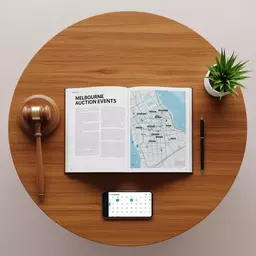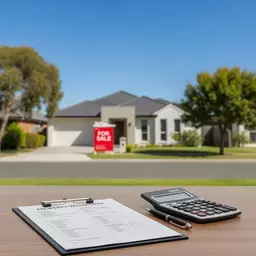Understanding Auctions in Victoria

Have you ever wondered how to navigate the exhilarating yet complex world of property auctions? With the right knowledge and preparation, you can transform this challenging journey into a successful investment opportunity. Let’s explore the essential takeaways that will empower you in the vibrant Melbourne auction scene.
What You Will Learn
- The auction process in Victoria involves a public sale where properties are sold to the highest bidder, ensuring a transparent environment for both buyers and sellers.
- Familiarity with auction terminology, such as *reserve price* and *vendor bids*, is crucial for making informed decisions during the bidding process.
- Legal frameworks regulate auctions in Victoria, necessitating knowledge of auction rules, buyers' rights, and the auctioneer's responsibilities for a smooth transaction.
- Preparation is key; ensure you bring proper identification, documentation, and understand the bidding procedure to increase your confidence and chances of success.
- Emotional and financial implications of bidding can lead to overspending; setting a budget and adhering to it is essential to avoid long-term financial strain.
- If a property passes in at auction, remain calm and explore post-auction negotiation strategies, which can lead to securing the property at a better price.
- Understanding the next steps after winning an auction, including signing contracts and paying deposits, is vital for a seamless transition to property ownership.
Key Steps in the Auction Process
Understanding the auction process is crucial. Below are the main steps involved, represented visually.
1. Registration to Bid
Provide identification and possibly a deposit to ensure you are a serious bidder.
2. Bidding Procedure
The auctioneer will call for bids starting from a set price, where bidders indicate their offers.
3. Winning the Auction
If you are the highest bidder, sign the contract and pay the necessary deposit to secure ownership.
4. Post-Auction Strategies
If the property passes in, engage with the auctioneer for potential negotiation opportunities.
Understanding Property Auctions in Victoria: An Overview
Welcome to the exciting world of property auctions in Victoria! If you're considering buying or selling a property, grasping the auction process is essential. This article aims to provide you with a solid understanding of how auctions work, ensuring you're well-prepared for your journey in Melbourne's bustling real estate market. Let's dive in!
What is an Auction Process in Victoria?
An auction is a public sale where properties are sold to the highest bidder. In Victoria, auctions are a popular method for selling real estate, providing a transparent environment for buyers and sellers. The auction process typically involves a set date and time, where interested buyers gather to bid on a property, competing against each other in real-time.
During the auction, the auctioneer plays a vital role in facilitating the bidding. They announce the starting bid and encourage participants to place bids until the property is sold. This fast-paced environment can be thrilling, making it crucial for buyers to be well-informed and confident. For additional tips on preparing for an auction, you can read more about preparing for a real estate auction.
- Understand the roles of the auctioneer and participants.
- Know the auction date, time, and location.
- Familiarize yourself with the property details beforehand.
The Importance of Knowing Auction Basics
Understanding the basics of auctions is the first step towards becoming a successful buyer. Knowledge is power, and being informed can help you make sound decisions. For instance, familiarizing yourself with key terms like *reserve price* and *vendor bids* will set you up for success on auction day.
Additionally, knowing what to expect can significantly reduce anxiety. If you've attended a few open inspections or even watched an auction before, you'll feel more comfortable when it’s your turn to participate. Remember, the more prepared you are, the more confident you'll feel!
- Learn common auction terminology.
- Attend prior auctions to observe the process.
- Prepare by researching properties of interest.
Key Components of the Auction Process in Victoria
Now that we've covered the basics, let's explore the key components of the auction process. As a passionate real estate expert, I can tell you that understanding these elements can greatly enhance your auction experience. Each part plays a pivotal role in ensuring a smooth transaction.
Legal Framework Governing Auctions in Victoria
Another critical aspect of property auctions is the legal framework that governs them. In Victoria, auctions are regulated by strict laws to protect buyers and sellers. Understanding these regulations can empower you to navigate the process effectively.
Understanding Auction Rules and Regulations
Each auction follows specific rules that buyers must adhere to. For instance, you’ll need to be aware of the *auction conditions* and any requirements for registration. Familiarizing yourself with these rules will not only prepare you for the bidding process but also ensure you comply with the legal aspects of the transaction. Learn more about bidding strategies for Melbourne auctions to gain an edge.
- Review the auction terms and conditions carefully.
- Know your rights as a buyer.
- Be aware of the auctioneer's authority and responsibilities.
Reserve Price and Vendor Bids Explained
The *reserve price* is a crucial term in auctions, representing the minimum price a seller is willing to accept. If bidding does not reach this price, the property may not be sold. In addition, *vendor bids* are a tool used by the seller to stimulate interest during the auction. Learning how these concepts work will help clarify the auction dynamics.
As someone who understands the Melbourne auction landscape, I encourage you to ask questions if you’re unsure about these terms. Knowledge will empower you to engage confidently during the auction.
Step-by-Step Guide to the Auction Process
To make the most of your auction experience, it’s essential to break down the process into manageable steps. This guide will walk you through what to expect and how to prepare effectively.
Registration to Bid: What You Need
Before you can participate in bidding, you'll need to register. This involves providing specific identification and sometimes a deposit. Registration ensures that only serious buyers can bid, creating a focused auction environment.
- Bring identification (drivers license or passport).
- Prepare any required documentation.
- Consider bringing a bank statement if a deposit is required.
Bidding Procedure: How it Works
The bidding procedure can vary, but generally, it involves the auctioneer calling for bids starting from a set price. Bidders raise their hands or use paddles to indicate their offers. The auctioneer then acknowledges each bid and encourages further offers until the property is sold or passed in.
It's important to stay calm and composed during this process. Engaging with the auctioneer and other participants confidently can also enhance your presence in the bidding war!
Winning the Auction: Next Steps and Contracts
If you're the highest bidder, congratulations! The next steps include signing the contract and paying the deposit. Understanding these steps is crucial for a smooth transition into ownership.
- Review the contract thoroughly before signing.
- Understand your obligations regarding the deposit.
- Ask questions if anything in the contract is unclear.
Frequently Asked Questions about Property Auctions
Here are some common questions about property auctions to help clarify the process:
- What is the typical auction process in Victoria?
The typical process involves public bidding on a set date and time, facilitated by an auctioneer, where the property is sold to the highest bidder if the reserve price is met. - What is a 'reserve price' in an auction?
The reserve price is the minimum price the seller is willing to accept for the property. If bidding doesn't reach this amount, the property may not sell. - What are 'vendor bids'?
Vendor bids are bids made by the auctioneer on behalf of the seller to help stimulate interest and move the bidding closer to the reserve price. They must be announced by the auctioneer. - What documents do I need to register for an auction?
You typically need to provide identification, such as a driver's license or passport, and sometimes a deposit or proof of funds, depending on the auction rules. - What happens if a property 'passes in' at auction?
If a property passes in (meaning it doesn't reach the reserve price), it means it wasn't sold under auction conditions. Buyers then have the opportunity to negotiate directly with the seller after the auction. - What are the legal consequences if I win an auction but fail to complete the purchase?
Failing to complete a purchase can lead to serious legal consequences, including forfeiture of your deposit, potential legal action from the seller, and damage to your credit rating. - Is it possible to negotiate the price after an auction if the property didn't sell?
Yes, if a property passes in, buyers can often negotiate directly with the seller through the agent. This can be an opportunity to secure the property at a mutually agreeable price.
In conclusion, understanding the auction process in Victoria is essential for anyone looking to buy a property. With the right knowledge and preparation, you can approach this exciting venture with confidence! Remember, at Auctions Melbourne, we're here to provide expert advice and insights to help you navigate this vibrant market. Stay tuned for the next part of our article!
Pro Tip
Did you know? One of the best strategies for participating in property auctions is to set a strict budget and stick to it. Emotions can run high during the bidding process, and it's easy to get carried away. By establishing your maximum bid ahead of time, you can avoid making impulsive decisions that could lead to financial strain. Remember, the goal is to secure a property that fits your needs without compromising your financial stability.
Risks and Considerations in Auction Buying
Participating in property auctions can be thrilling, but it's crucial to recognize the risks and considerations involved. Understanding the emotional and financial implications of bidding can help you make better decisions. For instance, have you ever thought about how your emotions might affect your bidding strategy? When the stakes are high, it’s easy to get carried away!
One of the most pressing issues is the potential for financial strain if you’re unprepared. It's essential to know what risks you're taking when you bid and how you can mitigate them. Auctions can be unpredictable, and sometimes, properties may not meet your budget expectations. This is why doing your homework is vital!
Emotional and Financial Implications of Bidding
When engaging in the auction process, it's important to consider how bidding can impact you both emotionally and financially. A rush of excitement can lead to overspending, which can have long-lasting effects on your finances. Set your budget beforehand and stick to it—this strategy can keep you grounded amidst the excitement of auction day. For more insights on this, explore effective mastering auction mind games.
Moreover, if you find yourself unable to complete a purchase after winning a bid, there can be significant legal consequences. Do you know what that could mean for you? Let me break it down:
- Potential loss of your deposit.
- Possibility of legal action from the seller.
- Damage to your reputation among real estate professionals.
Legal Consequences of Not Completing a Purchase
Failing to finalize a purchase after winning at auction isn’t just a minor setback. Legal implications can be severe. It's essential to understand your obligations once you place a bid. Have you ever considered the ramifications of not following through? Here’s what could happen:
- Loss of your initial deposit, typically around 10% of the purchase price.
- Litigation costs if the seller decides to take legal action.
- Future difficulties in securing property financing due to a damaged credit rating.
Post-Auction Strategies: What if the Property Passes In?
So, what happens if the property you're interested in passes in? Don't worry; there are still options available. Many buyers experience this situation, and knowing how to navigate it can open doors to new opportunities. Let's explore some effective post-auction strategies.
First and foremost, it’s essential to stay calm and assess your options. Remember, just because the property didn’t sell at auction doesn’t mean it’s off the table! Here are some tips for negotiating post-auction successfully:
- Reach out to the auctioneer or real estate agent to express your interest.
- Prepare to make a fair offer based on market research.
- Be flexible with your terms to encourage the seller to consider your proposal.
Negotiating Post-Auction: Tips for Success
Negotiating after an auction can be a great way to secure a property at a more reasonable price. If you find yourself in this situation, I recommend keeping these tips in mind:
- Be prepared to act quickly—properties can move fast!
- Approach negotiations respectfully; remember, the seller may be disappointed.
- Have your financing ready to speed up the process, which could work in your favor.
Understanding the Post-Auction Process
After an auction, the steps can vary depending on whether the property was sold or passed in. Here’s a simple breakdown of what to expect:
- If sold, you’ll be required to sign a contract immediately.
- Ensure your deposit is paid within the specified timeframe.
- If the property passes in, engage with the sellers for potential offers.
- Keep track of deadlines related to the process to avoid complications.
Staying informed about these risks and considerations can help you navigate the auction process more confidently. If you want to delve deeper into auction strategies, remember that at Auctions Melbourne, we’re here to support you with expert insights tailored to the vibrant Melbourne market. For a comprehensive guide to understanding property values, check out accurate property valuations in Melbourne. Happy bidding!
Recap of Key Points
Here is a quick recap of the important points discussed in the article:
- Understand the auction process, including the roles of the auctioneer and participants.
- Familiarize yourself with auction terminology, such as *reserve price* and *vendor bids*.
- Prepare for the auction by attending previous auctions and researching properties of interest.
- Be aware of the legal framework and auction rules in Victoria to protect your rights.
- Register to bid by bringing necessary identification and documentation.
- Set a budget before bidding to avoid emotional overspending and potential legal consequences.
- If a property passes in, engage with the auctioneer for potential post-auction negotiations.








